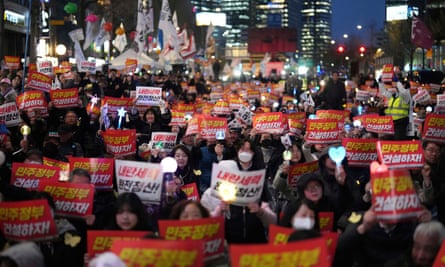It had been a long and at times intolerable wait. But the South Korean constitutional court’s decision on Friday to oust Yoon Suk Yeol from office may have restored the public’s faith in their democracy.
For 22 minutes, millions of South Koreans held their breath as the chief justice of the constitutional court, Moon Hyung-bae, began delivering the court’s verdict on Yoon’s impeachment over his chaotic declaration of martial law in December.
With each damning statement, Moon raised the hopes of the crowds outside who had been demanding the suspended president’s permanent removal from office.
Yoon’s actions, he said, had constituted “a serious challenge to democracy”, adding that the 64-year-old conservative populist had “committed a grave betrayal of the people’s trust” in bringing about South Korea’s worst political crisis since it became a democracy in the late 1980s.
When Moon finally uttered the words: “The defendant president Yoon Suk Yeol is hereby removed from office,” the crowd erupted with cheers.
The ruling sets in motion a 60-day countdown to elect a new leader, the date to be confirmed within 10 days by the acting president, Han Duck-soo.
Political parties are scrambling to select candidates, with the Democratic party’s Lee Jae-myung currently leading the polls. Yoon’s conservative People Power party has the unenviable task of selecting a candidate who is untainted by association with Yoon’s failed administration.
The national assembly’s first impeachment vote in December was an opportunity for the party to distance itself from Yoon. Instead, People Power MPs doubled down, boycotting the vote and continuing to back their embattled leader.
They then amplified what many believe to be Yoon’s groundless claims that previous elections, including a national assembly vote earlier in the year, had been mired in voting fraud. The conspiracy theories found fertile ground among Yoon’s supporters, who adopted Trump-style slogans such as “stop the steal” as they took to the streets.

By invoking cold war language about “pro-North Korean, anti-state forces” to describe his political opponents, analysts said Yoon deepened the political divide in an already polarised country.
Whoever becomes president later this year faces the unenviable task of healing those divisions and rebuilding trust in the democratic institutions that Yoon so casually undermined.
The ruling marked the end of a tumultuous three years for the conservative populist. The former senior prosecutor who had led the case for impeachment against the then president, Park Geun-hye in 2017, now has the same ignominious postscript to his presidency.
Having won the 2022 election – beating the liberal Lee by the slimmest of margins – Yoon was initially admired as an assertive and strong-willed leader, until those qualities were exposed as an unwillingness to compromise or accept criticism.
As he struggled to implement budgets and key policies in the opposition-controlled national assembly, Yoon grew increasingly irritable, targeting critical journalists, confronting striking doctors, blocking attempts to investigate corruption allegations involving the first lady, Kim Keon Hee, and labelling opposition MPs as a “den of criminals” working in cahoots with communist North Korea.
Human rights activists welcomed Friday’s verdict. In a statement, Human Rights Watch said Yoon’s attempt to impose martial law had “posed a grave threat to human rights and the rule of law”.
It added: “If martial law had been maintained, South Koreans would have faced the risk of arrest and detention without trial as well as severe restrictions on their freedom of expression and assembly, among other human rights violations. The constitutional court’s ruling was a decisive step to uphold human rights protections and democratic values.”
Some characterise Yoon’s removal as the start of a process to restore public faith in South Korea as a liberal democracy with a successful economy and a culture admired around the world.
Leif-Eric Easley, a professor at Ewha University in Seoul, said the court’s verdict had “removed a major source of uncertainty. And not a moment too soon, given how the next administration in Seoul must navigate North Korea’s military threats, China’s diplomatic pressure, and Trump’s trade tariffs”.
It is a sentiment shared by anti-Yoon protesters who had gathered outdoors to watch a live broadcast of the verdict. When his removal was announced, they cheered, danced and cried. “When the dismissal was finally declared, the cheers were so loud it felt like the rally was being swept away,” said Kim Min-ji, a 25-year-old protester. “We cried tears and shouted that we, the citizens, had won!”
But the saga is far from over. Few believe that candidates and voters in the forthcoming presidential election will be able to put the acrimony of the past four months behind them, while Yoon faces a separate criminal trial on charges of insurrection – a crime that carries a maximum term of life imprisonment or the death penalty.
“If people start refusing to accept any election outcome that is unfavourable to them, the other side will start doing the same,” said Kim Tae-hyung, a professor at Soongsil University in Seoul. “If that cycle continues, trust in democracy will completely collapse.”
Source: theguardian.com


















